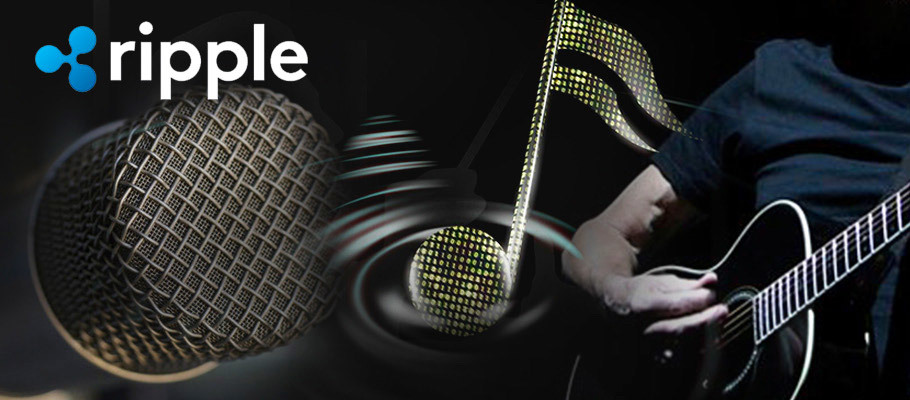
Published: February 21th, 2020
With its USD 10 billion valuation back in December, Ripple Labs became one of the major players in blockchain. Now its director of product Craig DeWitt has unveiled plans for a new music marketplace called xSongs.
Currently in beta, the blockchain-based platform will be a distribution network linking creators to buyers. Artists can upload music to the platform, and have it vetted for copyright. The only catch: artists must transact in Ripple’s XRP cryptocurrency
Anyone holding XRP can use xSongs now to purchase music. Artists set their own prices. The average song on xSongs comes in ca. 4 XRP or ca. USD 0.80.
Ripple’s DeWitt says he is personally funding the project and has no plans to monetise. He believes it will improve and add fairness to the way digital content creators are paid.
xSongs uses Payburner – which is another of DeWitt’s blockchain innovations – for ‘one-click’ XRP payments.
‘We’ve built a specialised wallet that enables music lovers to buy the songs they love with one click, and for artists to accept payments from anywhere in the world,’ he said in a statement.
Founded in 2012, Ripple rose to prominence in late 2017 as the value of XRP jumped in value during crypto’s extended bull market – alongside other virtual coins.
Ripple has since raised $200 million in an investment round last December, pushing its valuation up to $10 billion.
The company uses XRP to facilitate cross-border transactions for a network of financial institutions. There it uses blockchain for an alternative interbank messaging system that’s used by banks to send money around the world.
DeWitt says he took inspiration for the platform from Bandcamp – though the fees charged by Bandcamp for its services are too much he added.
In a statement around the launch he said that xSongs is a direct to artist model, so ‘while Bandcamp charges 15% plus a 6% processing fee, our platform and processing fees will always be zero.’
Bandcamp artists earned more than $445 million last year, but DeWitt says he has no plans to monetise his new music service, believing ‘that stuff will take care of itself over time.’
For its beta launch xSongs has distributed funds to about 500 Payburner accounts. DeWitt hopes to bring in at least 1,000 artists and generate 10k unit sales by late 2020. DeWitt also hopes to open xSongs to other kinds of digital content creation in the future.
How attractive a blockchain-based music marketplace will be to musicians remains to be seen. The risks include variables like platform stability, fluctuations in XRP, and uptake by consumers.
Even before xSongs, the music industry has been looking to blockchain as a way to save money and democratise the rights and royalties process for musicians, writers, publishers and everyone across the music industry’s distributed value chain.
In the age of streaming, getting paid appropriately has become harder. Entrepreneurs have looked to the insurance industry for inspiration, where the launch of B3i, the Blockchain Insurance Industry Initiative, has reduced payment and settlement times by an order of magnitude.
Blockchain promises to simplify rights and royalties management by providing a single version of the truth across the music value chain – regardless of territory and rights ownership specifics – ensuring everyone is paid the right amount and quickly. This could save the industry billions in delayed payments, lost revenues, and legal costs.
MediaChain is a peer-to-peer blockchain database designed to make sharing information across different applications and organisations simple and verifiable. For musicians, it ussues unique identifiers for each piece of open-source information. MediaChain also issues smart contracts to musicians that directly state their royalty stipulations without confusing third parties.
Musicoin is a blockchain-based music streaming platform. Using a called MUSIC, the company has created a specialiased global currency for music and music-related purchases. Musicoin aims to eliminate the need for third-parties, meaning any streaming revenue goes to the artist. The company’s blockchain platform allows transparent and secure peer-to-peer transfer of music.
Viberate, the world’s biggest live music database, holds more than 5,000 festivals, 460,000 artists, and half a million global music events. Viberate uses blockchain to manage its millions of data points (which are crowdsourced) with real-time rankings and profiles. Curated profiles display an artist's upcoming shows, videos, and social media engagement. The company rewards its community with VIB tokens, like MUSIC another digital currency specifically for the music industry.
Ujo, a decentralised platform creates a database of music ownership rights and automates royalty payments. Ujo's blockchain-based platform also lets artists upload original works, self-publish, control licensing, and manage distribution. Using Ethereum for transactions eliminates the confusion of music ownership by paying musicians using smart contracts and cryptocurrencies. Grammy-winning artist RAC and Imogen Heap have partnered with Ujo to release music, manage payments and establish chain-of-ownership.
Choon is a digital payment and streaming platform that uses blockchain to pay artists promptly and fairly. The company’s Ethereum-based platform enables artists to set up smart contracts with each song contributor, ensuring they receive an agreed portion of total revenue. Instead of waiting up to a year to pay artists, Choon releases money almost instantly based on how many streams have been recorded on any given day.